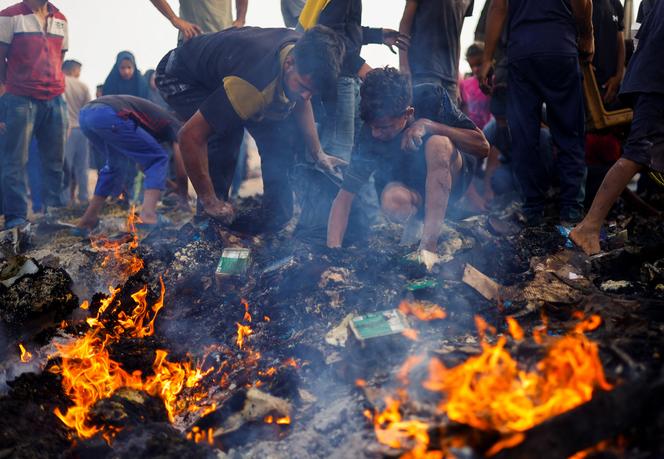


Flames lighting up the night sky. Screams piercing the darkness. Charred, dismembered bodies being pulled from piles of rubble, including the bodies of children. The images posted on social media by Palestinians from Rafah on Sunday, May 26, depict scenes of horror. The Barkasat tent camp in this southern Gaza Strip town was bombed by the Israeli army, causing dozens of casualties among the displaced population living there. Long spared by ground fighting, in the absence of air strikes, Rafah has been the scene of an Israeli ground offensive since May 7, a new phase in the war launched by Israel in retaliation for the October 7 Hamas attack.
The death toll from the bombardment had reached at least 40 on Monday, according to the Gaza Ministry of Health. "Ambulance crews are transporting a large number of martyrs and injured individuals following the occupation's targeting of the displaced persons' tents near the United Nations headquarters northwest of Rafah," the Palestine Red Crescent said on X, adding that "this location was designated by the Israeli occupation as a humanitarian area." The site, located in the Tell es-Sultan neighborhood, was not included in the areas ordered evacuated by the Israeli army earlier this month. It was managed by UNRWA, the UN agency for Palestinian refugees.
The French NGO Doctors Without Borders, which received more than 15 corpses and dozens of wounded in the makeshift clinic it runs in Rafah, said it was "horrified" by the event, which demonstrates once again that "there is no safe place" in Gaza. In a statement, the Palestinian presidency wrote that "this atrocious massacre perpetrated by the Israeli occupation forces is a defiance of all international resolutions." It accused Israel of "deliberately targeting" the displacement center.
The firing on the Barkasat camp came just over 48 hours after the International Court of Justice (ICJ) ordered Israel to "immediately halt its military offensive" at Rafah. This decision has had no impact. A few hours before the Israeli strikes, Hamas fired eight medium-range rockets from Rafah toward Tel Aviv. These rockets, which caused no casualties, were the first to target the city since January.
The Israeli army assumed responsibility for its bombing in the name of the fight against Hamas. "The strike was carried out against legitimate targets under international law, using precise munitions and on the basis of precise intelligence that indicated Hamas' use of the area," it said in a statement. The General Staff claims that the strikes were aimed at two of the Islamist movement's officials in charge of its activities in the occupied West Bank, Yacine Rabia and Khaled Nagar.
You have 68.67% of this article left to read. The rest is for subscribers only.
